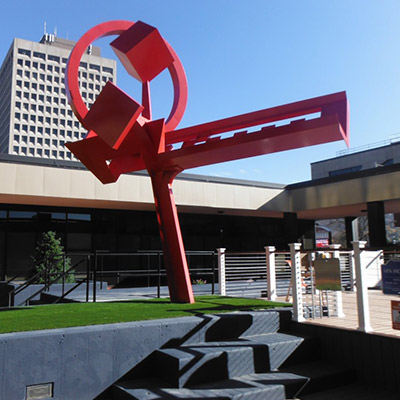EDITOR’S NOTE: Because he had social commitments out of town, the Broome Arts Mirror reviewer attended a final dress rehearsal of the play rather than a scheduled performance. Clocktower Theater Company was kind enough to agree to this arrangement.
By George Basler
Cat on a Hot Tin Roof is considered by some critics to be Tennessee Williams’ greatest play. I respectfully disagree. The Glass Menagerie or A Streetcar Named Desire will get my votes every time.
But the play is a major work by one of America’s greatest playwrights, and it’s a great showcase for the lead performers.
The Clocktower Theater Company’s production, which opened this past weekend (May 31-June 3) at the Cider Mill Stage in Endicott, is a solid, if uneven, staging of Williams’ work. The production is riveting at times, darkly funny at others and tedious in spots.
Williams’ play is a pungent stew of sexual tension, greed, family conflicts and the power of lies, or mendacity, as the characters keep intoning. In other words, it’s a textbook example of his Southern Gothic sensibility.
The plot centers on the Pollitt family, whose members bring dysfunction to a whole new level. They’ve gathered at the opulent Mississippi Delta estate of Big Daddy (Mike Arcesi) ostensibly to celebrate his 65th birthday. What’s really at issue, though, is who is going to inherit the estate after Big Daddy, who is dying of cancer, departs the scene.
On one side is the older son, Gooper (Adam Holley); his scheming, perpetually pregnant wife, Mae (Marjorie Dononvick), and their brattish collection of children.
On the other side is the younger son, Brick (Jake Wentlent), a dissolute former football player who is drinking himself into oblivion from despair over the death of his friend Skipper, and Maggie the Cat (Jessica Cadden Osborne), Brick’s bitter, sexually frustrated wife, who grew up poor and wants a cut of the estate. The other main character is Big Mama (Kate Murray), Big Daddy’s blowzy, long-suffering wife.
The play was considered shocking when it first opened in 1955 because it touched on issues of sexual frustration and homosexuality. A big part of Maggie’s bitterness is Brick’s absence from their marriage bed. In turn, Brick’s despair may be linked to guilt over his repressed sexual feelings towards Skipper.
While that was hot stuff 63 years ago, time and societal changes have lessened the impact. What hasn’t aged are the main issues in Williams’ play: fear of mortality, the conflict between fathers and sons, self-deception and the lies that humans tell themselves.
The Clocktower production, directed by Brad Morgan (who is also the company’s artistic director), has many fine moments, but it takes a while to get going and drags at times.
Part of the problem, at least in my opinion, is the structure of Williams’ play. Big Daddy is such a commanding character that he overwhelms the action. But Big Daddy is only on the stage in the second act when he and Brick confront hard truths about their lives. That’s when the real dramatic sparks fly, and the Clocktower production comes to life in a compelling way.
The first act, by contrast, is long and talky. Maggie spews venom about the other characters while Brick passively absorbs her anger. It simmers rather than boils.
The third act is entertaining and well-acted as the family gathers for a heated confrontation that plays like an episode of the old television show Dynasty with a Southern drawl. Morgan does a fine job directing it.
As Maggie, Osborne captures the defiant anger of the character. And, yes, her performance is blisteringly sexual. It’s a compelling piece of work. Where Osborne falls short, however, is finding moments of softness that would make the audience emphasize with Maggie. Then, again, Williams didn’t write a sympathetic character.
As Brick, Wentlent gives a one-note performance in the first act, either scowling or yelling. Admittedly this fits the character who, as written by Williams, is pretty much a sullen drunk.
But the character becomes more nuanced in the second act, and so does Wentlent’s performance. He successfully explores Brick’s layers of self-loathing and emotional pain that are on display in his intense confrontation with Big Daddy. In doing so, Wentlent salvages the role.
Arcesi gives a standout performance at Big Daddy. On one level, the character is a monster who is abusive to his wife, and those around him. On another level, he is a wounded bear of a man who can’t face the prospect of his own mortality and, with desperate energy, is trying to save Brick, the son he loves. Arcesi conveys the character’s complexity. His off-stage screams, as Big Daddy deals with the pain of death, are chilling.
Williams described Big Mama as “a short, stout woman … huffing and puffing like an old bulldog.” Murray brings this bulldog tenacity to her performance as she deals with Big Daddy’s impending death. In the process, she injects humanity into role that could be played as a grotesque caricature.
Donovick is fine and funny as Mae although, as written, the character is little more than the rancid stereotype of a Southern belle.
As Gooper, Holley brings some sympathy to an unsympathetic role. While the character is a schemer, he’s also a man who has been deeply wounded by his father’s rejection and is now looking for some payback. Holly makes his resentment understandable.
Cat on the Hot Tin Roof is a multi-dimensional play, and maybe one that is more to be admired than loved. Clocktower Theater deserves credit for taking it on.
IF YOU GO: Performances continue at 7:30 p.m. Thursday through Saturday and 3 p.m. Sunday, June 7-10, at Cider Mill Stage, 2 S. Nanticoke Ave., Endicott. Tickets are $18 to $28; purchase at clocktowertheater.thundertix.com.
The production also will be staged at 7:30 p.m. June 16 at the Theater North in Scranton, Pa.




































